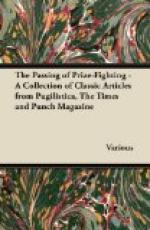This was one of the most successful scenes in the comedy. The death of Rupert, Mr. Morley’s song about “The sea,” the quarrel (which was about the great pivot of the plot, “the papers,” inscribed, says Martinuzzi,
“With ink that’s brew’d in the infernal Styx,”)
were all received with uproarious bursts of laughter.
In the fifth act, we behold Martinuzzi and the usurping young Queen making matters up at a railway pace. She has it all her own way. If she choose, she may marry Castaldo, retire into private life, be a “farm-house thrall,” and keep a “dairy;” for which estate she has previously expressed a decided predilection[4].
[4] Acting play, published in the theatre, p. 32.
But it is the next scene that the author seems to have reserved for putting forth his strongest powers of burlesque and broad humour. Isabella and Castaldo are together; the latter feels a little afraid to murder Martinuzzi, but is impelled to the deed by a thousand imaginary torches, which he fears will hurry his “moth-like soul” into their “blinding sun-beams,” till it (the soul) is scorched “into cinders.”
Castaldo appears, in truth, a very bad barber of murders; for, as he is rushing out to
“Strike the tyrant down—in
crimson streams
Rend every nerve,”
Isabella has the shrewdness to discover that he is without a weapon. Important omission! The incipient assassin exclaims—
“Oh! that I had my sword!”
but at that moment (clever, dramatic contrivance!)
[Enter CZERINA, with a drawn
sword.]
“CZERINA. There’s one!
Thine own!”
Far from being grateful for this opportune supply of ways and means for murder. Castaldo calls the bilbo a “fated aspic,” upon the edge of which his “eye-balls crack to look,” and makes a raving exit from the stage, to a roaring laugh from the audience.
It is quite clear to Isabella, from his extreme carelessness about his tools, that Castaldo is not safely to be trusted with a job which requires so much tact and business-like exactitude as the capital offence. She therefore “shows a phial,” which she intends, “occasion suiting,” for “Martinuzzi’s bane;” thereby hinting that, if Castaldo fail with his steel medicine, she is ready with a surer potion.
The next scene, being the last, was ushered in with acclamations. The stage, as is always in that case made and provided, was full. There is a young gentleman on a throne, and Czerina beside it, having been somehow ungallantly deposed. Martinuzzi expresses a wish to drink somebody’s health, and this being the “fitting opportunity” mentioned by the author in the scene preceeding, Isabella empties the phial of her wrath into the beverage, and the Cardinal quenches his thirst with a




